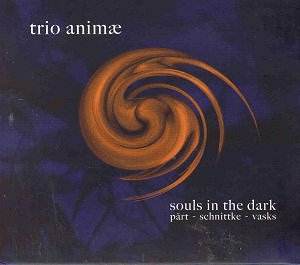AVAILABILITY
office@disquesoffice.ch
These works are united
by their emergence from under the Soviet
heel. The most approachable is the Mozart
pastiche by Pärt. The music has
classical poise. It is based on the
middle movement of Mozart's F major
sonata written when the composer was
nineteen. Its fidelity to Mozartian
style can be compared with Silvestrov's
Chopin and Beethoven works as well as
Rochberg's works of the 1970s. The Schnittke
is much more gritty and caustic. While
it does have some moments of sampler
fireside innocence it is mostly far
too knowing to peddle much in the way
of balm. Lesions and scar tissue are
more the order of Schnittke's day. With
Schnittke you are convinced that the
wooden village is still a smoking desolation
- comfort comes only in the self consolation
of the final few bars (13.10) but it
is a chilly comfort.
Vasks’ tribute to Messiaen
does not sound like the French composer;
no reason why it should. This is its
second recording the first being on
Conifer 75605 51272 2. The eight movement
Episodi e canto perpetuo piano
trio is gaunt and unforgiving. Late
Shostakovich puts in an manic appearance
from time to time as in Burlesca I.
Burlesca II is suggestive of
a dance of death. Then comes the unction
of the Canto perpetuo where the
lachrymose sense of reconciliation recalls
the slow bloom of the ‘hymn’ from Panufnik's
Sinfonia Sacra.
This version is recorded
with more instant impact than the Conifer
recording but is otherwise similarly
intensely expressed.
Brief multilingual
notes. CD presented in a cardfold sleeve.
Rob Barnett
